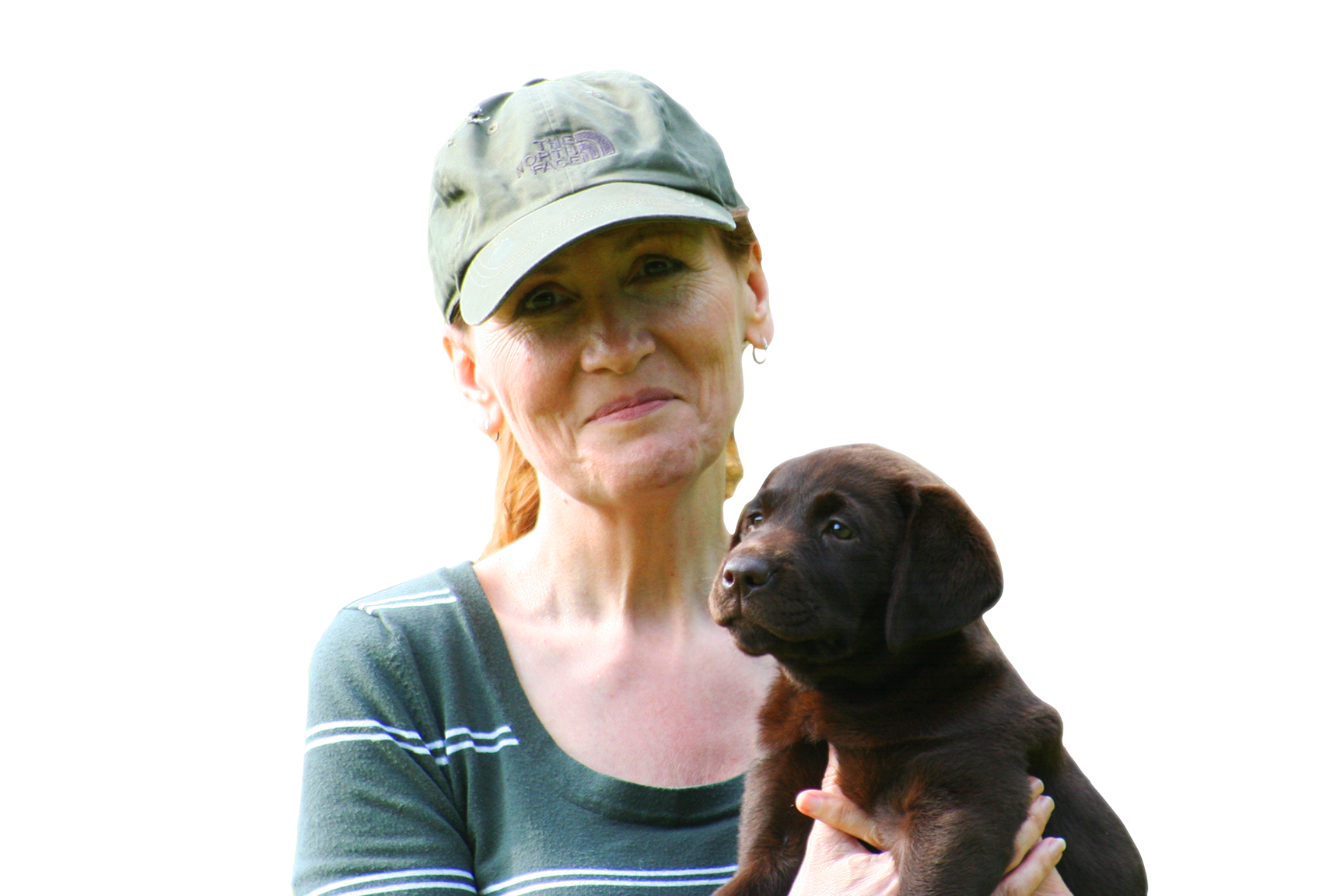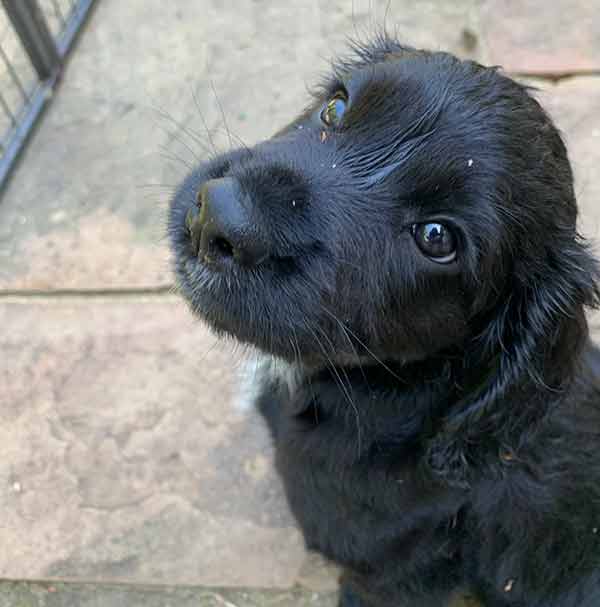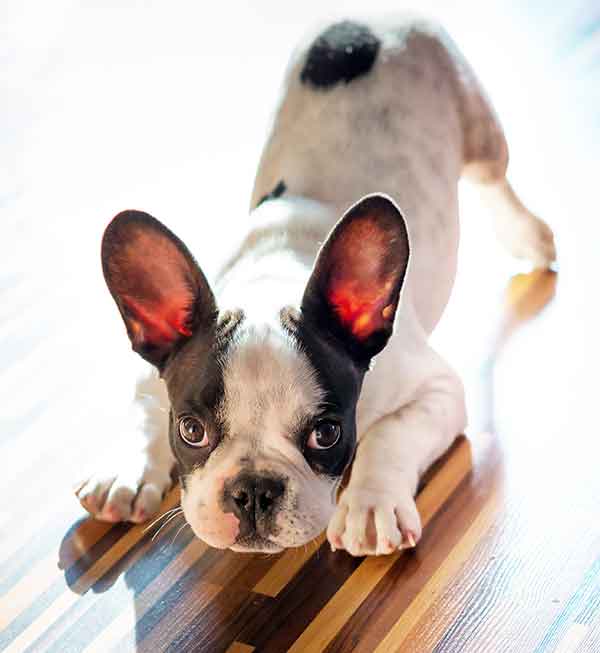Puppies pee and poop a lot! Potty training teaches your puppy where to eliminate, and a good potty training system helps you manage your puppy



Written by: Pippa Mattinson
This page is dedicated to you and your puppy’s very first week together.
You’ll also find lots of information on feeding and other aspects of general puppy care in our puppy guides section, and there are some quick links below to help you find what you need
We’ll be looking at what you can expect to happen during the next few days and nights with your puppy.
And at easy ways to avoid common new puppy problems such as night-waking and frequent potty training accidents.
The moment you carry your new baby dog over the threshold is the beginning of an amazing adventure. But you are quite likely to experience a rollercoaster of emotions.
For many new puppy parents, the day you bring your puppy home is the culmination of weeks or months of preparation, planning and excitement.
It's normal to feel a little overwhelmed by the responsibility of caring for a new life
The next few days can be a bit of an anticlimax. You may be left with a feeling of “here I am, and here is my puppy, but what do I do now?”

It’s not unusual to feel a bit panic stricken and overwhelmed with the responsibility for this new life.
And one of the best ways to restore your peace of mind is to know exactly what to expect and how long it will last!
Most eight week old puppies are curious, affectionate and playful.
They may seem a little shy and cautious when first placed on the floor of your home, but their confidence will increase minute by minute provided they are not left alone.

Not leaving a puppy alone for the first few days is important, if you want your puppy to settle in quickly.
Most puppies have never been alone in their lives before they leave their brothers and sisters at eight weeks old.
If left alone many new puppies will cry, and if no-one responds, that crying will turn to screaming. This can be quite a shock because small puppies have surprisingly large voices!
A well-adjusted dog is capable of relaxing on their own for a few hours. A new puppy is not. And the transition to being able to relax alone needs to be taken in stages.
Because learning to be happy alone is a big deal for your puppy. And because leaving the only home they have ever known is a big deal too, it's important that they don't have to adjust to these two massive life changes at the same time.
Learning to be alone is a big deal for your puppy
Of course you will want your puppy to learn to sleep or relax quietly while you take a shower, or leave the house for a few minutes. But perhaps counter intuitively, you'll get there faster, if you start a bit later.
Keep your puppy with you for the first few days & nights
Don't attempt to teach your puppy how to be alone, until they have got to know you and your home a little bit. That means for the first few days and nights, it's best to take your puppy with you, even to the bathroom. Or leave them with another family member.
Most puppies are greedy and will eat more than they need. Because their digestive system is still very new, puppies are also prone to diarrhea.
Feed little and often to avoid tummy upsets
Dividing a puppy's daily food ration into several small portions helps avoid these tummy upsets. You can learn about different ways of feeding your puppy, and find out how much and how often to feed your puppy, on our puppy feeding page.
Your new puppy does not know where you want them to pee and poop, and has little control over their bladder and bowels. When they need to go, they need to go NOW.
Effective potty training relies on repeatedly taking your puppy to the area where you want them to toilet, and ensuring that you take them often enough to avoid accidents indoors.
For new puppies, that may mean taking them every 15 to 30 minutes at certain times of day. The gaps between bathroom breaks can be widened gradually over the next few weeks
Follow this link to read more about potty training
Tiny puppies often surprise their new puppy parents with the ferocity of their play.
Many puppies growl and snarl fiercely when they are playing. This is perfectly normal and does not mean your puppy is aggressive.
Puppies can bite very hard when they play too, and need some help learning to 'pull their punches'. This is more likely to be a problem in a week or two.
It is normal for small puppies to need attention at night. Most eight week old puppies will need to pee at least once during the night, so keep a flashlight and slippers handy for your night time outings.
If your puppy is in a playpen or a puppy proof room then they will just pee on the floor. If your puppy is in a small crate they will cry until you let them out, and if you don't let them out quickly, they will wet their bed.
Bed wetting can become a habit and needs to be avoided at all costs
It's not uncommon for new puppy parents to become very sleep deprived. And while some night waking is inevitable with most puppies, it's important to keep this to a minimum
New puppies sleep a lot. Up to 18 hours a day. And they need time to adjust to their family's sleeping and waking schedule.
Many puppies are around ten weeks old before they sleep through the night. Mainly because that's how long it takes for their bladder to last a full 8 hours before it needs to be emptied.
You can help this process by making sure that their last meal is several hours before your bedtime, and by removing their water bowl a couple of hours before 'lights out'.
Help your puppy 'wind down' before they go to sleep. Avoid rough and tumble games or getting the puppy overexcited at bed time.
Avoid over-exciting your puppy at bedtime
After their last meal of the day, many puppies will go to sleep on your lap while you watch TV. This happy state of affairs may last for the first week or so. After that they tend to become more lively and want to play or chew at your clothes.
To avoid your new puppy crying their heart out for much of the night, it's a good idea to have them close to you for the first two or three nights.
Place a travel crate or sturdy cardboard box next to your bed. Raise it up level with your face if possible using a chair or box.
For a good night's sleep keep your new puppy close
If the puppy can smell you and hear you they will sleep until they need to pee. And you'll hear them moving about when they need to go outside.
Puppies need to feel safe in order to relax quietly. Your puppy is in a strange (to them) home and most eight week old puppies are scared to be left alone in a strange place. So until your puppy feels at home and safe, they will probably scream very loudly indeed if you put them in a room on their own for the night.
It's your choice, but being room mates for the first few nights is usually the best option for your puppy, and their family.
Listening to your tiny puppy crying is very distressing. There are several reasons why a new puppy might cry, including cold, wanting to pee, and fear or loneliness.
Most puppies at eight weeks old can maintain their body temperature in a family home. And unless you have a very small breed of puppy in a very cold house, the room temperature is unlikely to be the cause of their crying.
If your puppy is trapped on its bed (in a small crate for example) then they may cry when they want to pee. In a larger space, where the puppy can leave its bed it will simply do that, and pee on the floor.
The most likely reason for a new puppy to cry is through loneliness or fear. Both these factors are often entwined, as a lonely puppy cries because they are afraid of being alone.
Loneliness is the most common cause of crying in new puppies
It's not normal for a well fed puppy, that has access to somewhere to toilet and human company, to keep crying. A puppy that has a full tummy and an empty bladder, yet cries constantly whether they are being held or placed on the floor, needs to see a veterinarian.
You'll find more information to help you with a sad puppy in our article on new puppies that cry at night
New puppy parents are often surprised by just how often their puppy needs to pee. That tiny bladder doesn't hold much and your puppy has only minimal control over it for the first few weeks.
The occasional accident is inevitable, but it's important to minimise these as puppies learn to be clean in the house much faster if they are helped to succeed most of the time.
A puppy that needs to poop will start to run quickly back and forth before turning in a circle and squatting. The whole running, circling and squatting sequence takes only a few seconds so you need to be quick!
Puppies Need The Bathroom
Some puppies will whine or yelp a bit before they poop, but many will give no other sign.
For the first week or two, your puppy may need to pee every hour or so. And at certain times of day, some puppies will be ready to pee again after 15 or 20 minutes.
This can be challenging if you are busy, but it is a short lived phase. In just a few weeks your puppy will be much better at waiting.
Most puppies do not ask to go out until they are several months old. Even then, many young dogs will just wait quietly by the door and unless you are watchful you may miss their polite request.
It's common for puppies to fail to empty themselves out in the yard, then pee on the kitchen floor when they are brought back inside.
This is annoying but it's caused by one of two things. Either you didn't wait outside with your puppy for long enough. Or you didn't go outside with them.
Most new puppies do not like being alone outside and are unlikely to pee unless you go with them. You have to wait until the puppy pees, even if it's ten minutes or so. This will get quicker once the habit of peeing out in the yard is established.
If the puppy doesn't pee after ten minutes, carry them indoors and cuddle them or place them in a small crate for ten minutes then carry them outside and try again
Establishing the habit of emptying themselves in the right place is crucial for effective potty training and worth the investment of time at this early stage.
You'll find lots more information on our puppy potty training schedules page.

Puppies pee and poop a lot! Potty training teaches your puppy where to eliminate, and a good potty training system helps you manage your puppy

When I reflect on how I felt during my dog’s puppy period, the answer is easy: I was very, very tired! Puppies sleep a lot,

Learning how to teach a puppy not to bite can seem like a big deal, but with my tips and advice you’ll have this problem

It’s important to remember that puppies are individuals and some will achieve good bladder control before others. But knowing that you are on the right

In this expert guide to puppy development stages you can check your puppy’s weight against our puppy growth chart, learn about important puppy milestones and

A puppy crying at night is a common problem for many new dog owners. It usually boils down to one of a handful of common
To read more puppy feeding articles, check out our library of breed specific puppy feeding guides
Recommended: